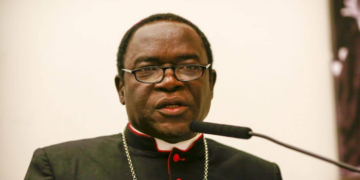As we count down to the general elections next year, political events that will shape the outcome of the polls are unfolding and making headline news. It is the same story around the world – especially when the political season sets in.
The “January 6” hearings in the United States are helping to confirm what we always knew about Donald Trump: a bad loser. When he won the elections and assumed office as president, he amplified the division within the United States from his bully pulpit and created two Americas. Since then, he has not been able to tweet because he used the micro-blogging site to spread hate speech and falsehood.
Ultimately, political power belongs to the people. Americans denied Trump a second term although he ignorantly claimed he was rigged out of the White House. A second term in office for Trump would have been disastrous for America and the rest of the world. We must never forget that politics is a game of numbers and voters will always go along with campaign issues that will make their lives better.
In the United Kingdom, Boris Johnson knew he was living in self-denial. Even when it became crystal clear that his time was up as prime minister, he was still bluffing. Johnson, in his wildest imagination, thought he still had the magic wand and he could charm his way as usual with the Brits, but he was clearly mistaken. His score card was not good enough
Whereas he was popular as a Brexiteer, he is now quitting office in disgrace. After mass resignations from his cabinet hit him like a bolt out of the blue, the Tories lost confidence in his leadership and he was forced to resign.
The message was loud and clear: enough was enough; it was time to go and move out of No 10 Downing Street. Conservative MPs are working on his replacement which has narrowed down to two candidates – Rishi Sunak and Penny Mordaunt. The new prime minister will be announced on September 5.
After the first round of voting, six candidates – this included 42-years old Nigerian-born Kemi Badenoch who scored 40 votes – were still in the race.
I concede that our democracy – when compared to what we have in the United States and United Kingdom – is still work-in-progress but it is our collective responsibility to make it work. Whether Kemi Badenock would have had a similar opportunity to become president of Nigeria is doubtful but her scathing message to Nigerian politicians is food for thought. “Nigerian politicians,” she alleged, “use public money as their private piggy-bank.” This is an old story and common knowledge but it was important she highlighted it.
Badenock went on to say that socialism in Nigeria is synonymous with “poverty and broken dreams”. For once, let us be honest with ourselves and answer this simple question: what has changed since 1999 in terms of the quality of life of Nigerians?
Perhaps the answer to this intriguing question will allow us make some sense out of the raging controversy of the Muslim-Muslim ticket announced by Asiwaju Bola Ahmed Tinubu, the presidential candidate of the All Progressives Congress (APC).
After what appeared to be a long wait arising from widespread consultations, Tinubu picked Senator Kashim Shettima, a former governor of Borno state, as his running mate. Since the announcement, the impression has been created that Tinubu has committed an unpardonable sin. In branding, controversy creates news and news helps to build brands but this may not have been Tinubu’s idea of brand building.
Well, that is only one side of the story. If we check who is making the loudest noise in this matter, it is Babachir Lawal, former secretary to the government of the federation (SGF) and a strong ally of the APC presidential candidate. Is he still an ally?
Lawal, in a memo, condemned the choice of Shettima, describing the Muslim-Muslim ticket as “disastrous” for Nigeria. But the same Lawal was chairman of the committee that recommended 11 possible running mates that included Senator Shettima and to the best of my knowledge, he has not denied being a member of the committee. Shettima actually topped the list.
What Asiwaju did was to adopt the committee’s recommendation and announced Shettima as his running mate. So why is Lawal crying more than the bereaved? This is why politicians can never be trusted and Lawal’s betrayal and cunning behaviour are at the heart of Kemi Badenoch’s portrayal of Nigerian politicians as “bad, selfish, dishonest and greedy” people.
Indeed, there are 18 political parties with presidential candidates and running mates and voters should exercise their freedom of choice. As far as I’m concerned, we should not split hairs over this matter.
Understandably, the Christian community is pissed off by the Muslim-Muslin ticket because it is difficult to convince them that Asiwaju Tinubu or the committee that made the recommendation could not find a suitable Christian candidate from the northern region. Abdullahi Adamu, APC chairman, is also not helping matters. He announced in Daura recently that the choice was “God’s will” without any explanation.
Why bring God into the matter? Did God direct Tinubu to pick Shettima? His comment was not reassuring and he should have allowed for more introspection, knowing fully well that the Christian community is angry at this time. It is comforting that we still have about seven months to the general elections and I have no doubt in my mind that most of the critical issues would be straightened out before then.
Going forward, the strategy should be that of persuasion to achieve mutual understanding and inclusiveness. As a multi-cultural society with different faiths, the incoming administration cannot afford to undermine any group or region because they all have interests to protect. However, these varying interests have to be aggregated and properly aligned to make the task of nation building easy.
The point must also be made that politicians map out their territories so easily for one reason: enlightened self-interest. I doubt if there’s any politician who does not have an interest to protect; this is why they lobby, negotiate and engage in horse trading.
I’m sure you will agree with me that when politicians come together for their usual rendezvous, the colour and scent of money does not discriminate between Moslems and Christians. They end up patting each other on the back and smile to their banks.
Everyone has an interest to protect. US President, Joe Biden, is in Saudi Arabia and he announced to the world that he is there to “protect US interests”. In international diplomacy, we are always reminded that there are no permanent friends or enemies; what exists is only “permanent interests”.
Don’t be deceived by politicians who jump from one party to the other; it is all about individual interests and survival. In marketing management, such moves are called “strategic positioning”. Unfortunately, the story is always about “sharing” the national cake, only a few talk about “baking” the cake. Now that our economy is in bad shape, there’s really nothing to share anymore.
It would be unfair to say Asiwaju Tinubu did not consult widely before making his choice of running mate. For those who know Tinubu, apart from being an experienced politician, he is a strong leader who is ready to make difficult choices. Nigeria needs a strong leader at this time; it is what some people call “benevolent dictatorship”.
When the APC governors in the north agreed that the presidential ticket of their party will be zoned to the southern region, it eventually worked to Tinubu’s advantage. In picking his running, it was evident he would work with the governors as part of a broad stakeholder management strategy to achieve their “mutual interest”.
This was what led to the committee’s recommendation where Shettima was the first choice as vice presidential candidate. The late Chief MKO Abiola, a Muslim, did it in 1993 when he picked Ambassador Babagana Kingibe, also a Muslim, as his running mate.
The governor of Kaduna state, Nasir el-Rufai who is a Muslim, also chose Hadiza Sabuwa Balarabe, a Muslim, as his running mate during the last gubernatorial election. She became the first female deputy governor of the state. Chief Abiola and el-Rufai recorded victories but were they just victories for their own sake or it became politically expedient for them to make those choices? Political science researchers should explore this subject further.
Things have just got to change and it is Asiwaju’s job to tell Nigerians how he intends to take Nigeria to greater heights. By the way, Tinubu is a Muslim but his wife is a Christian and pastor in the Redeemed Christian Church of God. What does that tell you?
Clearly, accepting a Muslim-Muslim ticket was a difficult proposition for him for those familiar with his worldview and track record of performance in Lagos state when he was the governor. How will Tinubu and Shettima islamise Nigeria as it is being alleged? Are we not going to have Christians in his administration if he wins the presidential election next year?
I think the conversation should shift to the competence and performance records of all the presidential candidates and their running mates. We should interrogate their vision for a better Nigeria. What can they do differently in view of the mounting challenges that we are faced with?
We are where we are today because we have allowed religion, tribe and zoning instead of competence in the absence of mediocrity to dominate our political conversation. We should worry about how the candidates for next year’s elections can make our lives better. Maybe we should invite British Conservative MP, our own Badenoch, to Nigeria to drive home the message.
I can tell you for free that she will speak on insecurity, corruption in high places, vote buying, greedy and selfish political elite, poor infrastructure, state police, mismanagement of resources and the high cost of governance – both at the national and sub-national levels.
But I have good news for us: Nigeria will not go down without a fight because Nigerians will push back.
When the third term gambit was promoted by former president Olusegun Obasanjo and his collaborators, the plot failed woefully due to the resistance by “patriotic” Nigerians in the national assembly.
The push back succeeded because there was a convergence of individual interests and national interest. There are other examples but for now, our political leaders must understand that Nigeria is too big to fail.
Braimah is a public relations strategist and publisher/editor-in-chief of Naija Times (https://ntm.ng)





